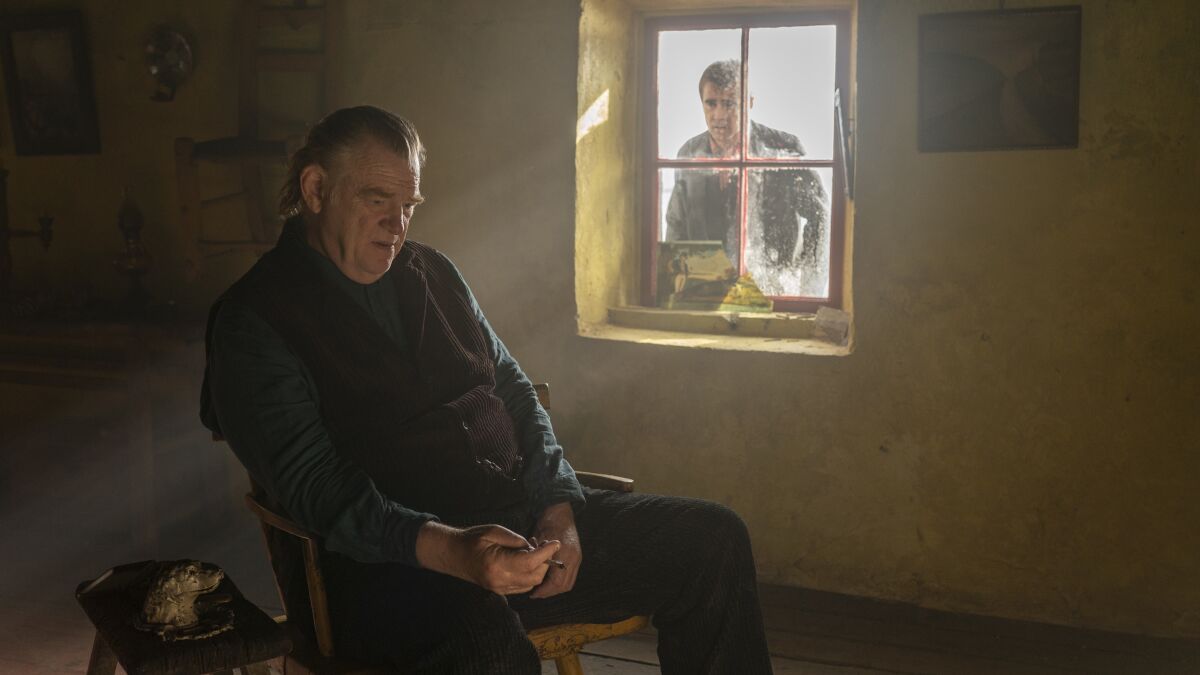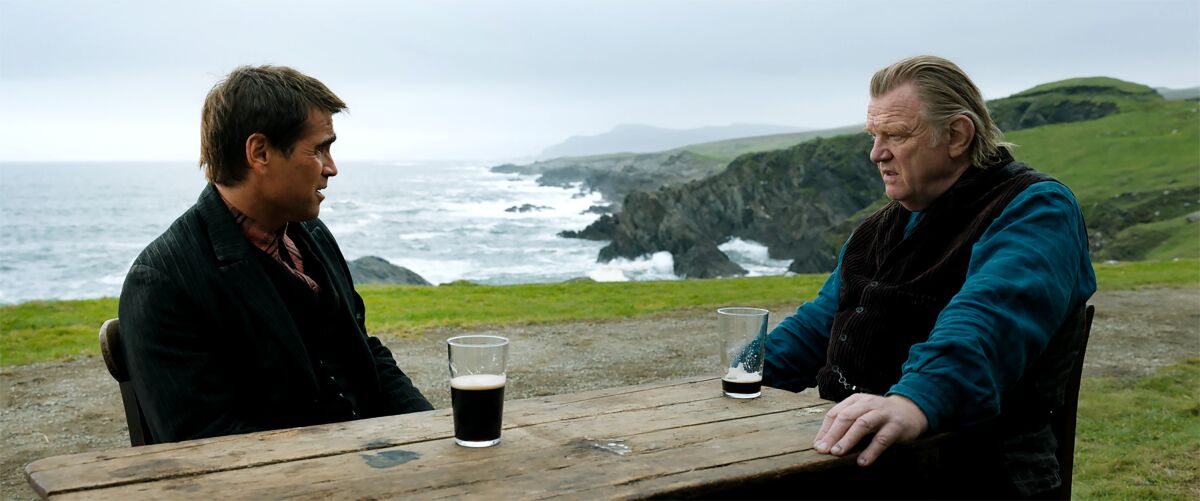Colin Farrell and Brendan Gleeson fix the Oscars and go behind that ‘Banshees’ ending
Colin Farrell, Brendan Gleeson and I have been talking for about an hour — more accurately, they’ve been talking, I’ve been listening — when Gleeson asks me if I thought there was a glimmer of hope at the end of their movie, “The Banshees of Inisherin.”
Before I can answer, Farrell jumps in. “Brendan Fraser thanks us for that. He actually surprised me. He’s the first person that thought there were reparations at the end and that things were going to be OK.”
“There you go,” Gleeson says, smiling.
“I told him that,” Farrell replies. “I said, ‘Brendan would f— love to hear that.’” (Farrell would fill up the swear jar by the end of our conversation.)
The ending of “Banshees of Inisherin,” a film about the fallout following the abrupt dissolution of a friendship, has been a point of debate between Gleeson and Farrell, friends themselves who met a year or two before making Martin McDonagh’s 2008 feature debut, “In Bruges.” (McDonagh also wrote and directed “Banshees,” and if you haven’t seen the movie, this might be a good time to stop reading as there are spoilers ahead.)
The movie’s final scene on the beach finds Gleeson’s character, the musician Colm, thanking Farrell’s Pádraic for looking after his dog — mind you, this is the day after Pádraic set Colm’s home ablaze, with Colm still inside it — and Pádraic answers, “Any time.” Pádraic’s act of arson came as payback for the death of his beloved donkey, Jenny. Pádraic blames Colm because Jenny ate one of Colm’s severed fingers that he flung at Pádraic’s front door because Pádraic wouldn’t leave him alone … and … and …

Colin Farrell’s Padraic can’t take no for an answer when Brendan Gleeson’s Colm cuts him out of his life.
(AP)
“Too much has happened between these two!” I tell Gleeson. “I didn’t feel a glimmer of hope at all!”
Farrell laughs. “I knew that was coming!” he says. “There’s no doubt it f— felt a bit nice for him to say, ‘Thanks for looking after me f— dog.’ And I definitely meant ‘any time.’ But, as Colin, I don’t know that I get any kind of hope from that. I feel like I know too much.”
“Talk to them in a hundred years,” Gleeson replies, laughing.
“But I was thrilled that Brendan Fraser felt hope,” Farrell says. “Thrilled!”
“I think it reveals your nature, whether you feel hope,” Gleeson says. “Or, at least want it to be there.”
“Brendan and me, we’re both optimists,” Farrell says, gesturing toward Gleeson. “I’m a man who can get a good f— three-course meal out of a bit of hope. And so we talked about it and Brendan has really wondered if it’s there. It was like him wondering if there would be anything left in the charity box for Dominic’s father, who was a beast and cruel to one of the sweetest characters in the film. But at the end of the day, he’s a father looking at his bloated son’s body floating on the surface of a lake. And Brendan was wondering whether the audience would be able to extend an olive branch of sympathy.”
“The next time you watch it,” Gleeson tells me, “just have a look at [actor] Gary Lydon’s face when he sees his son’s body in the water. He’s human. And that’s Martin [McDonagh] showing that even the most vile, repulsive person has a degree of humanity.”
“It’s not forgiveness. It’s not redemption,” Farrell says. “But just showing that even monsters are capable of suffering loss.”
We’re talking the day after the Governors Awards, the motion picture academy’s black-tie evening during which honorary Oscars are awarded. This year, Michael J. Fox was honored along with directors Euzhan Palcy and Peter Weir and songwriter Diane Warren. Farrell and Gleeson attended, putting in an appearance along with most of the other contenders from films with Oscar aspirations. They could have done without the formal wear, but they had a marvelous time — much better than they expected — and couldn’t stop talking about it.
“I said to Brendan, ‘This is better than the Oscars have ever been,’” Farrell recalls. “There’s something about the lack of contesting the notion of a ‘best’ in a room. It was just a celebration of some fine artists and fine filmmakers and a fine humanitarian, of course, with Michael J. Fox raising $1.5 billion for Parkinson’s.”
“There was no bogus competition and no bogus anxiety,” Gleeson says.

Colin Farrell, left, and Brendan Gleeson in “The Banshees of Inisherin.”
(Searchlight Pictures)
“Maybe the Oscars are a little antiquated in a way and people have a strange notion of celebrity right now,” Farrell says. “You know, front-page news: Celebrities aren’t actually better than anyone else and in many cases, you could argue for the reverse. So you think about the Oscars. How does it play to the room? How does it make itself relevant? It can’t just be about a bunch of people in the room patting each other on the back, four losers, one winner in every category.
“I was thinking last night: Could there be a world where you just take the competition out of it,” Farrell continues, “and reveal all the winners beforehand so there’s no tension, no anxiety, no one pretending that they don’t want it or they’re shocked and really happy that someone else beat them. You just go and you celebrate the people. It’d be more joyful.”
“It’d be better if you knew before,” Gleeson agrees. And here Farrell turns into a one-man hallelujah chorus. “It would!” he shouts. Gleeson: “Then people could celebrate.” Farrell: “Exactly!” He’s practically jumping out of his seat, he loves the idea so much.
“Diane Warren talked about crumpling up the speech after you don’t win,” Gleeson recalls of the songwriter’s Governors Awards remarks. “And she said, ‘People ask me what it’s like to lose 13 times. I didn’t lose 13 times! I won 13 times!’” Farrell jumps in. “Yes!”
“There’s a kind of blood sport element to the Oscars,” Gleeson continues. “But I think people are bored of it now. The world needs a bit of hope and optimism.”
And, as you may remember, Gleeson firmly believes there’s a shard of hope in “Banshees.” The film ruminates on legacy and what makes a life worth living. For Colm, it’s leaving something behind that will live on in the future. For Pádraic, at least at the beginning, it’s about enjoying the simple pleasures that life offers.
“I remember talking to a fine musician, an incredible lyricist and poet, and he was working on his sophomore album, coming up against a few roadblocks,” Farrell says. “And he said, ‘I listen to scratchy vinyl records of chain gangs from the ’20s and ’30s and it’s so haunting. That’s what I want to leave behind.’ And I said to him, ‘But do you think the f— chain gangs were worried about their legacy? Or do you think they were just trying to keep their spirit alive that day?’ So I said to him, ‘If you just f— stay present, your legacy will take care of itself.’
“The ironic thing is that by the end of the film,” Farrell continues, “I don’t think the music will f— be remembered. But what will be remembered in two f— hundred years is the mad c— on the f— island chopping off his fingers and then the mad c— who used to be his best friend burned his f— house down.”
Gleeson laughs. “Best story ever!”
“And I’m here to tell you, their legacy is complete!” Farrell says, doubling over. “It’s just not what they thought.”
For all the latest Entertainment News Click Here
For the latest news and updates, follow us on Google News.
